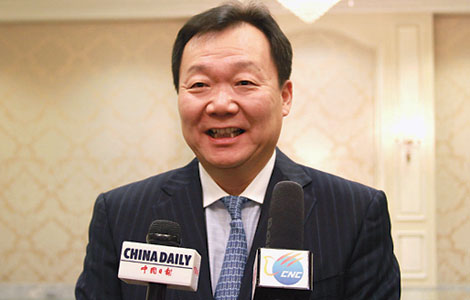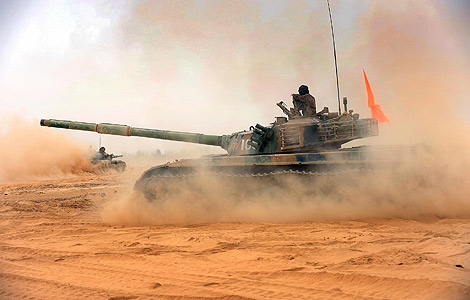Frugality drive takes its toll on fish, tea
Updated: 2013-03-30 07:01
By Tang Zhihao and Wu Yiyao in Shanghai (China Daily)
|
||||||||
The nationwide campaign against extravagance - called for by China's leaders - is being felt by producers and sellers of some of the country's best-known, and priciest, fish and tea.
Every spring, one of the most sought-after fish is the daoyu, or knife fish, an increasingly rare freshwater species living in the lower and middle reaches of the Yangtze River.
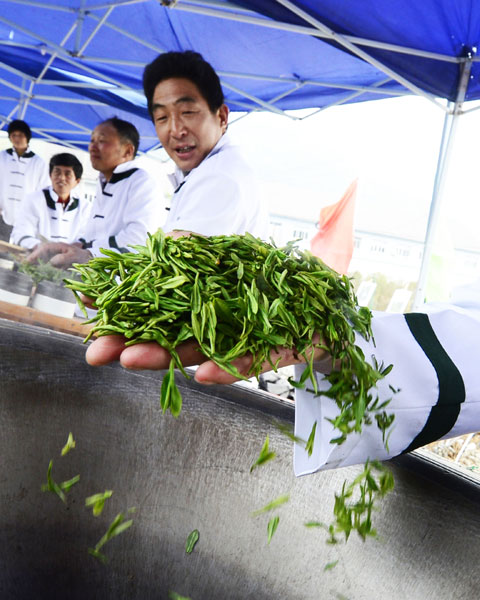 |
|
Premium spring Longjing tea is displayed at a festival in Hangzhou, Zhejiang province, on Friday. The government campaign against lavish dining has taken a toll on prices of high-end tea. LI ZHONG / FOR CHINA DAILY |
But this year, according to those involved in selling the knife fish - named because of its sleek and slender appearance - prices have failed to rocket as they have in previous years.
Prices reached record highs in March last year, when a top-notch knife fish, weighing around 175 grams, might have cost more than 16,000 yuan ($2,573) per kg in China.
But Jingjiang fishery law enforcement department said prices of knife fish have dropped by about 50 percent this year.
In Jingjiang, a city in Jiangsu province known for Yangtze knife-fish eating, prices are under pressure like never before, local traders said.
In Shanghai, at the Tong Chuan Aquatic Products Market, one of the largest trading markets in the city's Putuo district, fish weighing more than 175 grams are being priced at less than 2,000 yuan a kg, down from about 10,000 yuan a year ago.
However, vendors said demand has failed to rise despite the price falls.
"In my store, daily demand is less than 50 kilograms this year, down from hundreds of kilos in 2012," said Jin Zixuan, a vendor in the market, who has been selling the fish in Shanghai for more than a decade.
Eating knife fish is considered as a symbol of social status, and had become a yearly must for high-end, early-spring banquets.
But the popularity of the fish has fallen sharply.
Fishermen in Jingjiang, on the northern bank of the Yangtze, the best known tasting destination for knife fish, reported catching only 9 metric tons of the fish in 2012, down from thousands of tons in the 1970s, according to Jingjiang fishery law enforcement department.
Jin said the campaign against extravagance and waste has hit the market heavily.
The central government ordered senior officials to reject "extravagance, formalism and bureaucracy" in a list of eight new requirements released at the end of last year with the aim of combating corruption and improving working styles.
Figures from the China Cuisine Association show that revenue generated by high-end restaurants dropped 20 percent during Spring Festival this year, with some five-star and four-star hotels being put out of business.
But the impact now appears to have extended past that holiday season.
"Fewer restaurants have ordered knife fish this year, because of government calls for reduced extravagance and waste," Jin said. "Some wealthy people are clearly trying to keep a low profile."
Baigongguan, a high-end restaurant in Shanghai, said Yangtze knife fish is on offer at 2,000 yuan to 4,000 yuan per kg this year, lower than in 2012.
But it's not only expensive Chinese fish that are being affected this spring.
Tea farmers, like 53-year-old Li Yu, are reporting shrinking orders as the squeeze on extravagance continues.
Li, from Xihu district in Hangzhou, Zhejiang province, - a premium tea production area - said measures have had to be taken to secure income this year after seeing a drop in business, especially for premium West Lake Longjing tea gift boxes.
In 2012, the average price of premium West Lake Longjing tea she sold to wholesalers was about 14,000 yuan per kg, with many orders coming before February, a full month before the Qingming Festival, when tea trading reaches its peak.
"That 14,000-yuan tea is usually for gifts," Li said.
This year, however, orders for costly tea gift boxes have fallen by 40 percent, Li said.
This year's prices for luxury tea have yet to be decided, with picking and processing still to start, Li said, but she estimated there will be at least a 10 percent drop.
Contact the writers at wuyiyao@chinadaily.com.cn and tangzhihao@chinadaily.com.cn
Zhu Lingqing contributed to this story
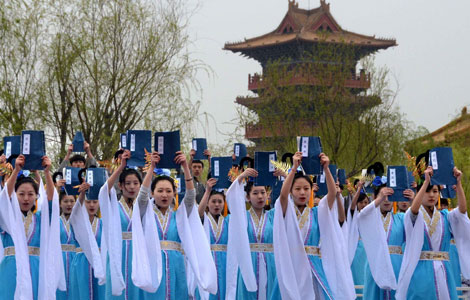
 Qingming Cultural Festival opens in C China
Qingming Cultural Festival opens in C China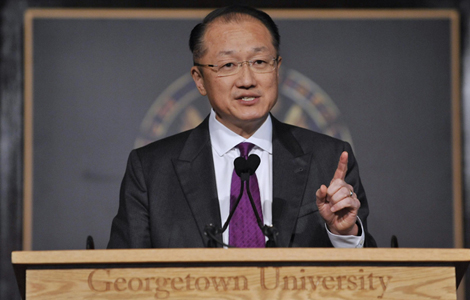
 World Bank seeks end to extreme poverty by 2030
World Bank seeks end to extreme poverty by 2030
 World Trade Center rises again
World Trade Center rises again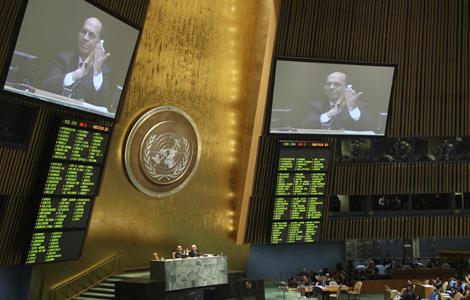
 UN General Assembly approves Arms Trade Treaty
UN General Assembly approves Arms Trade Treaty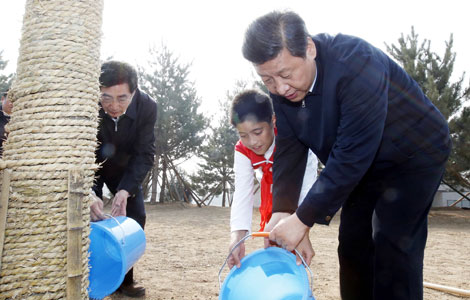
 Xi gives green light for planting
Xi gives green light for planting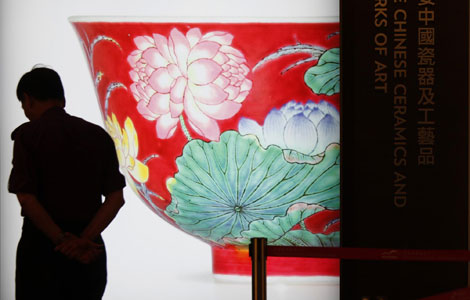
 Sotheby's to hold Spring Sale in HK
Sotheby's to hold Spring Sale in HK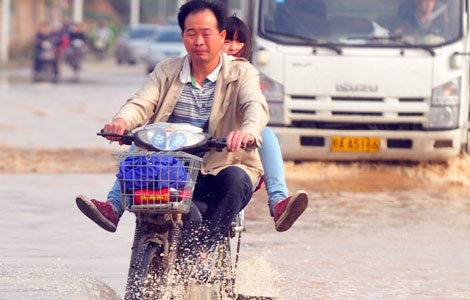
 Cities urged to step up drainage improvements
Cities urged to step up drainage improvements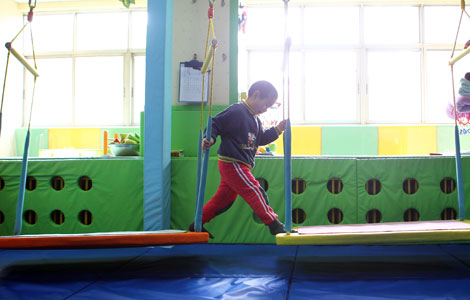
 Opening up on autism
Opening up on autism
Most Viewed
Editor's Picks

|
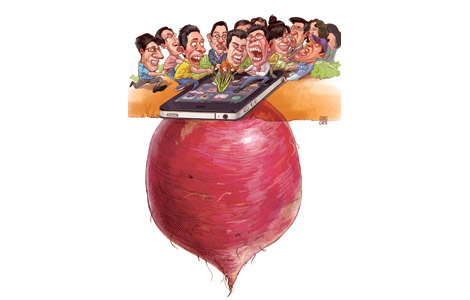
|
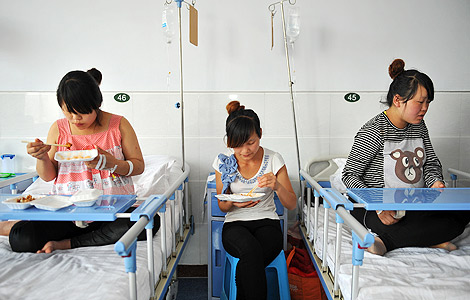
|
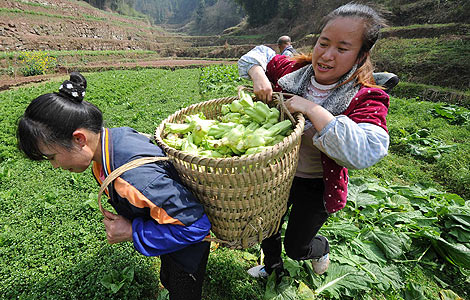
|

|
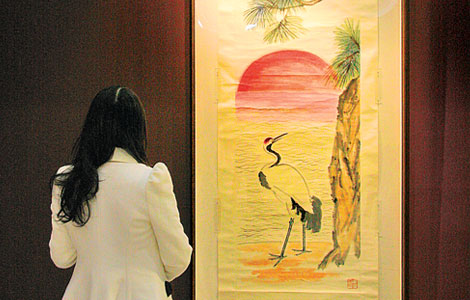
|
Today's Top News
China, US to deepen military ties
BYD to build electric bus assembly plant
Chinese becoming US citizens decline
Beijing calls for DPRK talks
Kerry reaffirms defense commitment to ROK, Japan
Caroline Kennedy may be US envoy to Japan
New Chinese Ambassador arrives in US
Apple revises warranty terms
US Weekly

|

|

